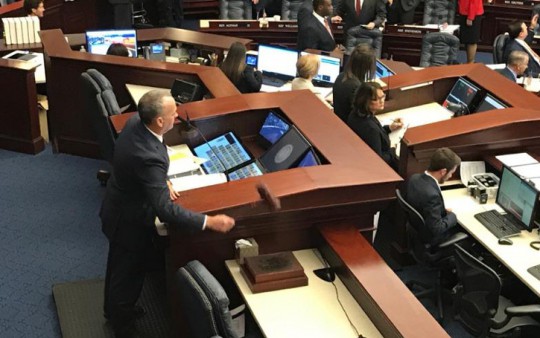Florida House Backs Making It Harder To Raise Taxes
January 26, 2018
TALLAHASSEE — In a priority of Gov. Rick Scott and Speaker Richard Corcoran, the Florida House on Thursday overwhelmingly approved a proposed constitutional amendment that would make it harder to raise taxes and fees.
The proposal, which could go on the November ballot, would require two-thirds votes by the House and the Senate in the future to increase taxes and fees, up from the usual majority votes.
“I believe that taking a citizen’s hard-earned money should not be done lightly,” sponsor Tom Leek, R-Ormond Beach, said before the House voted 80-29 to approve the measure (HJR 7001). “You either stand with the people whose money the government takes or you stand with the government that takes it.”
But Democratic critics argued that the current Legislature should not seek to tie the hands of future lawmakers in making decisions about taxes and spending. They said Florida lags other states in funding for such things as public schools and mental-health programs.
“Each and every session, there’s a different tension between taxes and revenue and what we want to spend money on and what we don’t,’’ Rep. Sean Shaw, D-Tampa, said. “I’m no smarter than someone who’s going to come here 10 years from now to vote. And so I don’t think I ought to have more power than that person that sits in this seat 10 years from now to vote. They should be able to vote up or down on tax policy, up and down on revenues, just like I do.”
While the measure easily passed, the House still needs to work out differences with the Senate before the proposed constitutional amendment could go before voters in November.
The Senate Finance and Tax Appropriations Subcommittee is slated Monday to take up a version (SJR 1742) that would require three-fifths votes of the House and Senate before taxes could be increased in the future — a lower threshold than the House plan. The Senate version also would not apply to raising fees.
But while differences remain, Scott and Corcoran have focused heavily on the issue in the early stages of the 2018 session. If a tax-limit proposal reaches the November ballot, it would require approval from 60 percent of voters to go into the state Constitution.
“When I first announced this proposal, Speaker Corcoran joined me to ensure we do all we can to let families and job creators keep more of their hard-earned money,” Scott said in a statement after the House vote. “Today, the Florida House of Representatives overwhelmingly passed this proposal in a bipartisan vote to give Floridians the chance to go to the polls and vote to make it harder for politicians in Tallahassee to raise taxes and fees.”
The proposed constitutional amendment was one of 19 measures approved Thursday by the House, including two health-care bills that have long been backed by Corcoran and other House GOP leaders.
One of those bills (HB 27), sponsored by Rep. Heather Fitzenhagen, R-Fort Myers, would eliminate the controversial “certificate of need” regulatory process for hospitals. Under the process, hospitals must seek approval from the state Agency for Health Care Administration before adding facilities or programs.
Fitzenhagen said eliminating the so-called CON process would increase competition and drive down health-care costs. But critics, such as Rep. Lori Berman, D-Lantana, argued it could lead to new hospitals in affluent areas “cherry picking” insured patients from older hospitals, which would be left serving larger proportions of low-income and uninsured patients.
The House, which voted 72-36 to approve the bill, also has passed CON repeals in the past but has not gotten agreement from the Senate.
Similarly, the House voted 97-10 to approve a bill (HB 37) aimed at encouraging the use of “direct primary care” agreements. Under the agreements, patients or their employers would make regular payments to doctors for primary-care services, at least partly cutting out the role of insurers.
The bill, sponsored by Insurance & Banking Chairman Danny Burgess, R-Zephyrhills, would make clear the agreements are not governed by insurance laws and regulations. Like with the CON repeal, the House in the past has been unable to reach agreement with the Senate on direct primary care.
Rep. Mike Miller, R-Winter Park, said the bill would address health-care costs and give decision-making power to doctors and patients.
“We’re trying to lower the cost of health care and improve the outcomes,” Miller said.
by Jim Saunders, The News Service of Florida
Comments
2 Responses to “Florida House Backs Making It Harder To Raise Taxes”




As a conservative (not a republican, I’m a independent). I realize that there is a balance between taxation needs (must pay our bills) and overtaxing people. The real problem is waste & funding projects for political gains (both parties are guilty of). Once those issue are address, Then, we can lower taxes.
I also think you don’t spend more money than you have money coming in to pay for it. The answer is not to simply cut taxes, just to make taxpayers feel better, we still have to pay those bills. We should never have to borrow money, that we can’t pay back.
To make it harder to raise taxes, when the needs arise, is foolish. This
would make it harder to govern.
we had a war 1776 with England over taxes .. now look at US